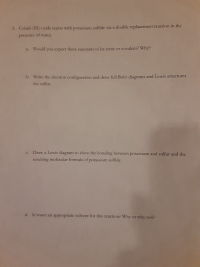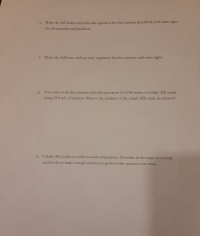
Chemistry
10th Edition
ISBN: 9781305957404
Author: Steven S. Zumdahl, Susan A. Zumdahl, Donald J. DeCoste
Publisher: Cengage Learning
expand_more
expand_more
format_list_bulleted
Question
Please replace Cobalt (III) Oxide with Cobalt (III) Chloride. Cobalt (III) Oxide was a typo/mistake in the print. The rest of the question can use Cobalt (III) Chloride.

Transcribed Image Text:3. Cobalt (III) oxide reacts with potassium sulfide via a double replacement reaction in the
presence of water.
a. Would you expect these reactants to be ionic or covalent? Why?
b. Write the electron configuration and draw full Bohr diagrams and Lewis structures
for sulfur.
c. Draw a Lewis diagram to show the bonding between potassium and sulfur and the
resulting molecular formula of potassium sulfide.

Expert Solution
This question has been solved!
Explore an expertly crafted, step-by-step solution for a thorough understanding of key concepts.
This is a popular solution
Trending nowThis is a popular solution!
Step by stepSolved in 5 steps with 3 images

Knowledge Booster
Learn more about
Need a deep-dive on the concept behind this application? Look no further. Learn more about this topic, chemistry and related others by exploring similar questions and additional content below.Similar questions
- What is the formula lithium nitridearrow_forwardDirections: Complete the chart Name Lead (IV) Bromide Titanium (II) Phosphide Silver Chloride Iron (III) Oxide Vanadium (V) Nitride Cation Present Pb+4 Anion Present Br1 Formula PbBr4arrow_forwardCan a polyatomic ion be considered a molecule or compound?arrow_forward
- Table E1: Names & Formulas of Covalent Compounds If you are given the name of the covalent compound, provide the correct formula. If you are given the formula of the covalent compound, provide the IUPAC name. Name Formula Sulfur dioxide Tetraphosphorus decoxide H2O N2O5 Ammonia Oxygen difluoride BCI3 S2Br2 Chlorine O2 Dinitrogen monoxidearrow_forwardAnswer all 4 parts of the questionarrow_forward24arrow_forward
- Need help with this questionarrow_forwardWhat is the chemical formula for Manganese (II) Iodide? Show your steps.arrow_forwardQUESTION 1 Fill in the missing information: formulas for missing compounds and ions, systematic/modern names of compounds, and whether the compound is ionic (I), covalent (C) or both (B). { NOTE: i) Write subscript numbers in the formulas as if you are writing letters in a word (e.g., Mg3N2 should be written as Mg3N2). ii) Do not put parentheses around monatomic ions but put them around a polyatomic ion if there is more than one in the formula (e.g. Na2C03 should be written as Na2CO3 but Ca(NO3)2 as Ca(NO3)2. )} (Use the letters I, C, or B to indicate the type of bonding in the compound.) Compound Formula Name of compound lonic (I), Covalent (C) or Both (B)? lons 2- 1+ NH 4 & SO 4 4+ Sn & CI 1- 2+ Fe & CH 3 CO0 1- AI 3+ & p 3- AIParrow_forward
arrow_back_ios
arrow_forward_ios
Recommended textbooks for you
 ChemistryChemistryISBN:9781305957404Author:Steven S. Zumdahl, Susan A. Zumdahl, Donald J. DeCostePublisher:Cengage Learning
ChemistryChemistryISBN:9781305957404Author:Steven S. Zumdahl, Susan A. Zumdahl, Donald J. DeCostePublisher:Cengage Learning ChemistryChemistryISBN:9781259911156Author:Raymond Chang Dr., Jason Overby ProfessorPublisher:McGraw-Hill Education
ChemistryChemistryISBN:9781259911156Author:Raymond Chang Dr., Jason Overby ProfessorPublisher:McGraw-Hill Education Principles of Instrumental AnalysisChemistryISBN:9781305577213Author:Douglas A. Skoog, F. James Holler, Stanley R. CrouchPublisher:Cengage Learning
Principles of Instrumental AnalysisChemistryISBN:9781305577213Author:Douglas A. Skoog, F. James Holler, Stanley R. CrouchPublisher:Cengage Learning Organic ChemistryChemistryISBN:9780078021558Author:Janice Gorzynski Smith Dr.Publisher:McGraw-Hill Education
Organic ChemistryChemistryISBN:9780078021558Author:Janice Gorzynski Smith Dr.Publisher:McGraw-Hill Education Chemistry: Principles and ReactionsChemistryISBN:9781305079373Author:William L. Masterton, Cecile N. HurleyPublisher:Cengage Learning
Chemistry: Principles and ReactionsChemistryISBN:9781305079373Author:William L. Masterton, Cecile N. HurleyPublisher:Cengage Learning Elementary Principles of Chemical Processes, Bind...ChemistryISBN:9781118431221Author:Richard M. Felder, Ronald W. Rousseau, Lisa G. BullardPublisher:WILEY
Elementary Principles of Chemical Processes, Bind...ChemistryISBN:9781118431221Author:Richard M. Felder, Ronald W. Rousseau, Lisa G. BullardPublisher:WILEY

Chemistry
Chemistry
ISBN:9781305957404
Author:Steven S. Zumdahl, Susan A. Zumdahl, Donald J. DeCoste
Publisher:Cengage Learning

Chemistry
Chemistry
ISBN:9781259911156
Author:Raymond Chang Dr., Jason Overby Professor
Publisher:McGraw-Hill Education

Principles of Instrumental Analysis
Chemistry
ISBN:9781305577213
Author:Douglas A. Skoog, F. James Holler, Stanley R. Crouch
Publisher:Cengage Learning

Organic Chemistry
Chemistry
ISBN:9780078021558
Author:Janice Gorzynski Smith Dr.
Publisher:McGraw-Hill Education

Chemistry: Principles and Reactions
Chemistry
ISBN:9781305079373
Author:William L. Masterton, Cecile N. Hurley
Publisher:Cengage Learning

Elementary Principles of Chemical Processes, Bind...
Chemistry
ISBN:9781118431221
Author:Richard M. Felder, Ronald W. Rousseau, Lisa G. Bullard
Publisher:WILEY